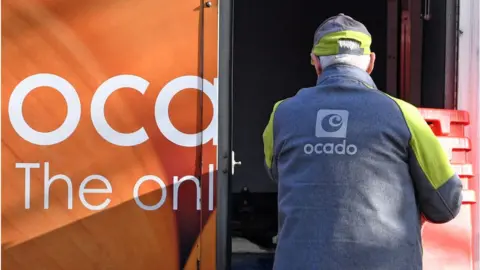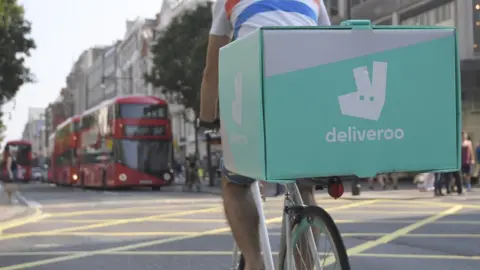Ocado sales hit as workers return to the office
 Getty Images
Getty ImagesOcado has reported a fall in sales as customers return to pre-pandemic shopping habits and costs increase.
In the three months to the end of February, retail sales for the online grocer fell 5.7% to £574.7m.
It said the return to the office by workers and the "euphoria" of going back out to restaurants after restrictions eased had reduced demand.
Rising costs and changing shopping habits saw the group cut its sales forecast for the year.
It now expects annual retail revenue growth "closer to 10%", rather than in the mid-teens, as it said last month.
But the results for its latest quarter also reflected a tough comparison from a year before, when the UK was in lockdown, Ocado added.
"The main thing that we're seeing [now] is people's willingness to behave more like they did pre-Covid," Ocado said.
"We've got two off-setting things at the moment though, where some people are still working from home several days a week- and that is a 'basket booster'.
"But that is getting offset by a bit of euphoria about that fact we can go back out to a restaurant, having been cooped up for two years [during Covid-related restrictions]."
Compared with pre-pandemic levels, Ocado's retail sales in the quarter were up 31.7%.
'Pre-Covid rhythm'
"The last quarter has been encouraging for Ocado Retail despite the clearly evident challenges the industry and consumers are facing," said Melanie Smith, Ocado Retail's boss.
"As we have seen since the end of Covid restrictions, the value of the average basket and shape of the week continue to normalise as we return towards the rhythm of our pre-Covid lives."
Although it saw a 15% drop in the average customer's basket size, Ocado said it was encouraged by an increase in the number of new shoppers on the platform.
But the retailer acknowledged that war in Ukraine and uncertainty over how demand will change during the cost of living crisis meant it was difficult to predict sales.
It said it had increased the prices of some products already "where costs could not be mitigated".
However, it is not yet seeing price rises as high as the current rate of inflation, which stands at 5.5% - the highest level seen in 30 years.
The group also insisted that it was a "price follower", which tries to match the prices of its big competitors.
Tesco's chairman warned recently that "the worst is yet to come" on rising food prices.
John Allan told the BBC he was aware people were on very tight budgets and having to choose between food and heating "troubles us", but added that grocers and suppliers were not immune from rising energy costs.
Ocado noted that it might be affected by rising energy costs in particular, due to the amount required to power the refrigerators in its distribution hubs and fuel required for its drivers.
 Reuters
ReutersSeparately, online delivery giant Deliveroo reported that its losses have deepened as the costs of its rapid expansion stack up.
The company posted a £298m pre-tax loss for the year, compared with a £213m loss in 2020, but stressed that it had a long-term plan for profitability.
It said its heavy losses for the past year were driven by big investments in marketing and technology improvements as it sought to keep up the momentum of orders being boosted during lockdowns, similar to Ocado.
In its UK business, order numbers increased by 72%. But it also predicted a slowdown in growth over the coming year.
Susannah Streeter, senior markets analyst at Hargreaves Lansdown, said: "For now it does appear that some pandemic habits are sticking around, with restaurant deliveries staying popular, on-call groceries increasingly in demand and a growing source of revenue for Deliveroo.
"But the cost-of-living squeeze is intensifying and as savings are eaten away, there may be less appetite to pay for an easier life."
